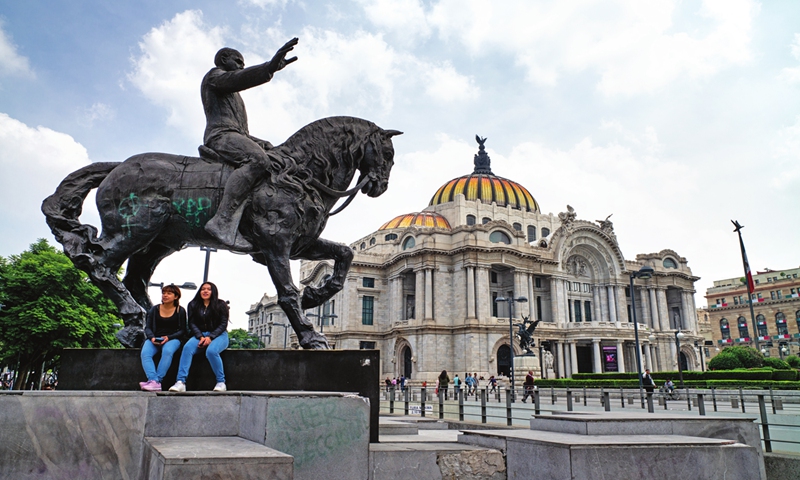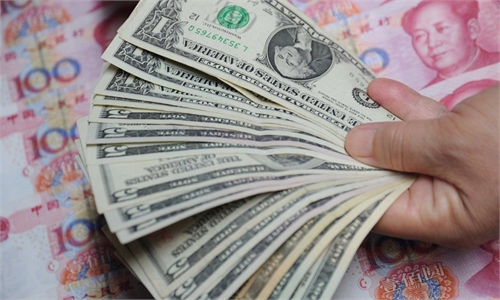US’ sizable rate-hiking may lead to recession, hindering Latin America
Many members endorse BRI, FTA with China for growth

Palacio de Bellas Artes in Mexico City, Mexico, 2019 Photo: VCG
Editor's Note: The US resorts to sizeable interest rate hikes to tame scorching inflation, which is hijacking developing countries including its allies under this manmade economic hardship amid the COVID-19 pandemic and Russia-Ukraine conflict. Latin America that has witnessed a "lost decade" due to the spillover from US' monetary policy tightening may see another economic crisis approaching. This is the second article of a multi-part series on the US' exporting of economic crises to the world.
As the driver of global monetary policy, the US selfishly has made the most aggressive move in 28 years by hiking interest rates by 75 basis points to tame domestic inflation amid concerns over an oncoming recession, which carries serious downside risks by aggregating the debt distress and currency depreciation pressure of developing countries, especially in Latin America where asset bubbles have been blown out by the US' ultra-loose monetary policy since the beginning of the pandemic.
The US Federal Reserve's rate-hiking cycle will create a lingering impact on Latin America in multiple senses, including raising dollar-denominated debt default risks, a plunge in local currencies and falling exports as demand softens, experts warned.
In 2020, the US Fed revamped its monetary policy by raising inflation expectations and lowing real interest rates to boost the economic recovery in the wake of the COVID-19 outbreak, with the interest rates reduced to near zero.
However, as its ultra-loose monetary policy backfires with US consumers feeling burned by high prices everywhere from supermarkets to gas stations, the Fed made an abrupt U-turn by aggressively hiking interest rates from March 2022 onwards, neglecting the global pain it may cause, especially to developing countries that are undergoing economic hardship amid the ongoing US' tariff war and the Russia-Ukraine conflict.
On Wednesday, the US interest rates were hiked by 75 basis points in the biggest move in 1994. Media reports said that the Fed plans to shrink its balance sheet by about $95 billion per month.
The Fed's steep interest rate hikes spark the retreat of much more capital from Latin American, resulting in depreciation of local currencies and worsening their debt problems, Zhou Zhiwei, an expert on Latin American studies at the Chinese Academy of Social Sciences, told the Global Times on Sunday.
Due to increased public expenditure to deal with the costs of the pandemic and maintain the standard of living, Latin America's public debt accounts for around 55 percent of the region's GDP, with some economies' debt ratio reaching as high as 70 percent, Zhou said.
The impact is "enormous" especially for Argentina, the largest debtor to the IMF, said Argentine economist Jorge Marchini, the Xinhua News Agency reported. "A rising interest rate obviously means a bigger [debt] burden," as Argentina's internal and external commitments are managed through variable rates set by the Fed rate, he said.
The US' steep interest rate hikes also accelerated investment outflow from Latin American countries - where the investment rate is as low as around 20 percent - adding pressure to the region's sluggish economic recovery that is already weighed in on by a contraction in spending and rise in the poverty rate, Zhou said.
"Among Latin American countries, Mexico will be directly impacted by a potential US economic recession as most of the country's industries heavily rely on the US, for example, petroleum, car components and agricultural products," Jiang Shixue, director of the Center for Latin American Studies at Shanghai University, told the Global Times.
For Latin America, the spillovers from US' monetary policy tightening have contributed to some of the worst economic crises in the region over the past several decades. In addition to the "lost decade," a period when the region witnessed contracted per capita income growth for the 1980s, the Fed's rate-hiking cycle in 1994 sparked another crisis in Mexico.
Struggles for economic revival
Amid a variety of challenges including slower growth in the US, tighter monetary and financing conditions and emergence of the Omicron variant, the IMF downgraded the region's economic growth forecast for 2022 from 3 percent to 2.4 percent in a January report.
It said that the region must ensure the sustainability of public finances, raise potential growth and do it in a manner that promotes social cohesion and addresses inequities.
To fight the negative impact of a stronger dollar, Argentina's central bank on Thursday raised its benchmark interest rate by 300 basis points to 52 percent, the sharpest rise since 2019, as the country's inflation hit a new 30-year high of 61 percent year-on-year in May.
According to the central bank of Argentina, the rate hike serves mainly to encourage savings in the hard-hit local pesos. "Their anti-inflationary action then largely involves contributing to exchange and financial stability, and must be complemented with other economic policy instruments to reduce inflationary inertia," it added.
Brazil, which is Latin America's largest economy, also raised its benchmark interest rate by 50 basis points to 13.25 percent on Wednesday, up sharply from a record low of 2 percent in March 2021.
"Many Latin-American countries have endorsed the Belt and Road Initiative and applied to join the Asian Infrastructure Investment Bank. Countries including Chile, Peru and Costa Rica have inked free trade agreements with China and others such as Uruguay and Ecuador are in process of negotiating deals," Victor Cadena, executive vice president of the Mexican Chamber of Commerce in China, told the Global Times in a recent interview.
China is also among the main sources of foreign direct investment in several Latin American countries, Cadena noted.

